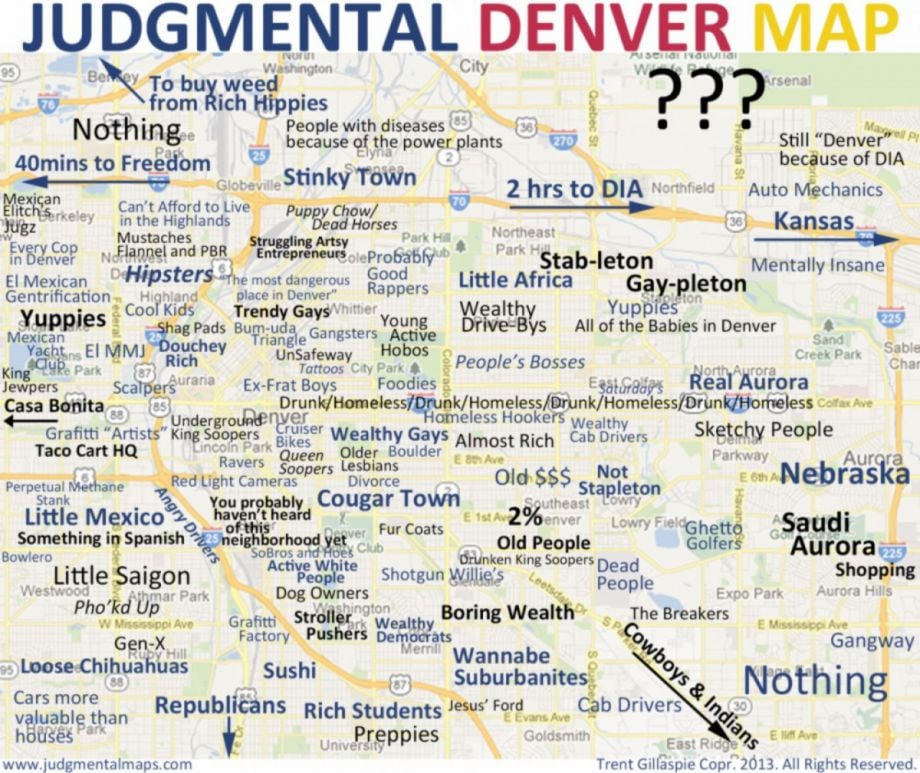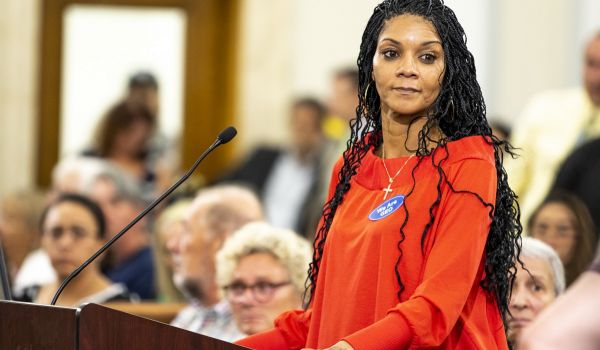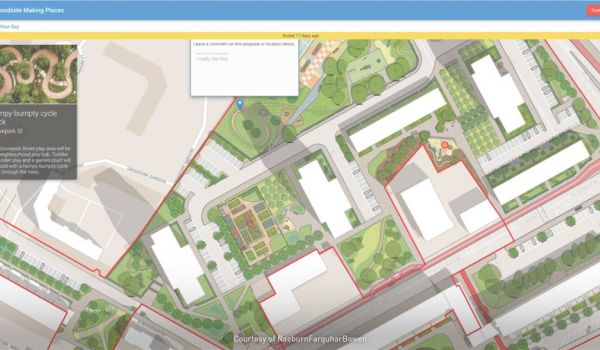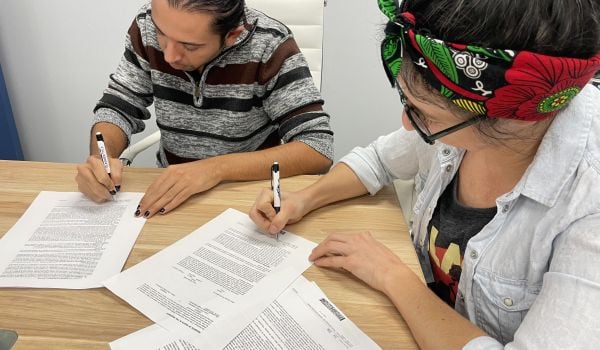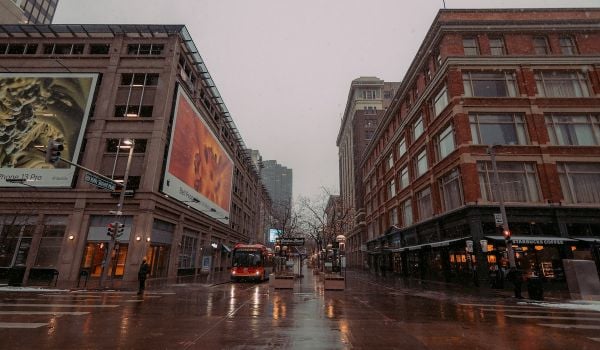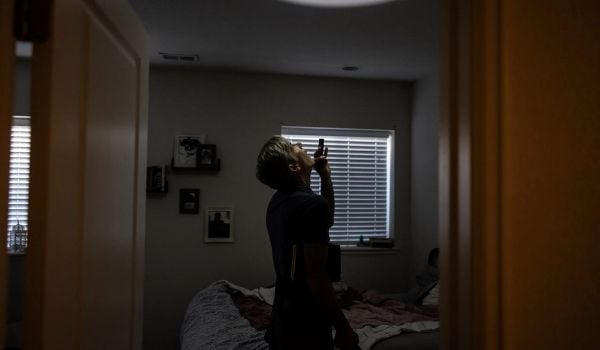When the blog Judgmental Maps features a city, the neighborhoods have names your friends might use over drinks. And not those newish, annoying portmanteaux like SoBro or NoLibs, but things like “soccer moms who can’t drive,” “super creepy ’50s area” and “ripe for future gentrification.”
There have been a dozen maps posted to the site so far, with five going up in the last month. A few have gone viral. You may have seen talk of the maps on your Twitter timeline.
Let’s not, it’s on point!!! RT @RVAmag: Let’s All Fight About This “Judgmental Map” Of RVA http://t.co/Ecz4UMWcVz http://t.co/YCfqvoNnOl
— Samantha Star (@SamanthaStar) February 21, 2014
Hahaha according to the judgmental map of NOVA I live between the rich republicans and entitled college brats. Woops
— Car✿lina (@noitscarolEEna) February 26, 2014
Who’ll help me create a satirical Judgmental Map of Delhi? @judgmentalmaps “Overpriced Hipster Cafes”….”Rapeistan.” pic.twitter.com/cNN2CJYyNL
— करोलिन मर्तिन् (@IndologistCM) February 26, 2014
Trent Gillaspie, a tech manager who also does stand-up comedy, created the site and made its first snark-covered map, portraying his hometown of Denver, in late January 2013. Since then, others have submitted maps of their own cities, from Los Angeles to Chicago to Nashville. We talked to Gillaspie about the maps, their popularity and why calling an area something like “where your barista lives” speaks to a lot people.
Next City: What inspired you to make a judgmental map of Denver?
Trent Gillaspie: Part has been through my comedy and some of the stand-up that I do, which pokes a little bit of fun at different parts of Denver. I grew up in Denver since ’95, and I knew the city inside and out, at least from the different parts I have lived in. Someone would say, “what part of Denver do you live in?” I could say, “We live off of 6th and Quebec.” And some people would say, “I sort of, yeah, I know where that is.” But it would be much different to say, “I live in taco cart headquarters.” And they’d say, “Oh yeah, the taco carts. Yeah, I totally know where that is.” And it became part of what I would do in describing to people where we live, [using] those area stereotypes.
I’m a big runner. Going around and exploring different parts of the city, you get a general feel of what living in that city, or that part of the city, is like. And I thought this was a neat way of putting those onto a map, and allowing other people to enjoy that same type of generalization of each neighborhood in Denver.
NC: How soon did you realize this could be an entire site of maps from all over the country?
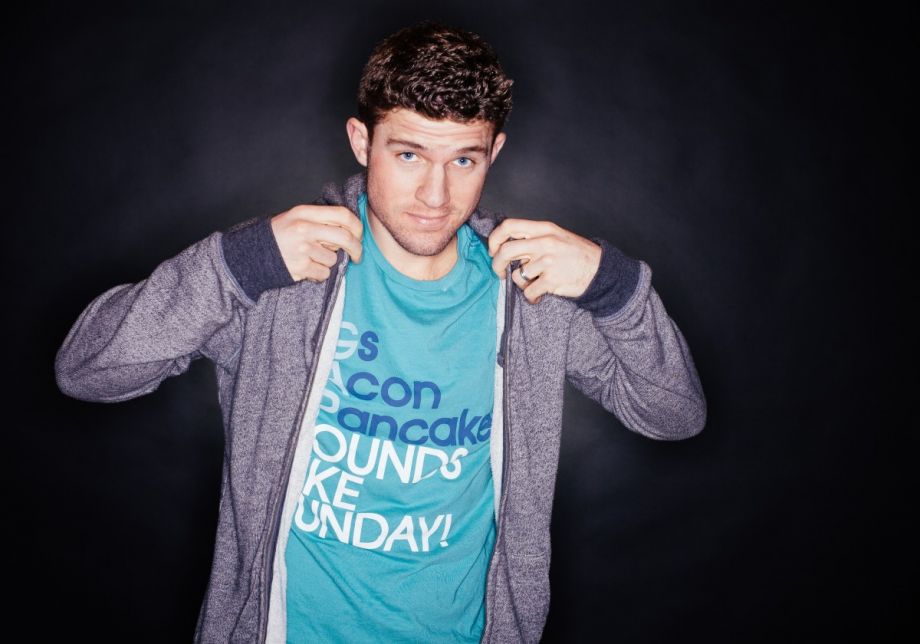
Trent Gillaspie. Credit: Andy Martinez
Gillaspie: Pretty quickly, because it hit pretty fast. I had originally not put my name on the map, because I didn’t know if [there] would be backlash, right? I was sort of afraid of a public response. As soon as I found out how much of an overwhelming positive response there was, I said, “No, no, no, wait, wait, wait, let me go back and tie my name to this.”
As soon as that started taking off, some of my friends said, “Hey, you should do one for Boulder.” “Hey, you should do one for, you know, another city that you could go and live in.” I thought about that. I said, “Well, why don’t we start a community where people can make these for different cities?” In one of the interviews I did with Fox in Denver, they said, “What’s your next city?” I can’t create another city without knowing the city. The people creating the maps need to be experienced, and live in the city and have their own unique view on their portion of the city. So we decided to throw it out to the community, and allow people to create and share with others.
NC: When did the submissions start rolling in?
Gillaspie: Basically, last February, right after we had sent out the Denver map. I actually reached out to a few fellow comedians in other cities. Joe Larson, a buddy in New York City, did the Manhattan one, which is really hard to get. Because it’s such a huge city, we just wanted to focus on one borough. Then I had buddies, Eric Oren and Katey Selix, who are comedians in Chicago, do the Chicago map pretty quickly. We got those, there was a little bit of traction. But all of a sudden, that same week I saw one come in from Phoenix from somebody. I had no idea who they were.
NC: How does one settle on a place name like “probably good rappers?”
Gillaspie: There’s some truth, right? And there’s some poking fun. And you have to poke fun at everybody. I think the more you poke fun at yourself, and poke fun at everyone, the less offensive it is in the end. I settled on “probably good rappers” because I know there has been some of the music scene that came out of the Northeast Park Hill area of Denver. I’m assuming there are probably good rappers in that area.
NC: How many more people are visiting the site now than they were last February?
Gillaspie: The traffic on the site comes in waves. It’s neat to see how some cities respond differently to maps than others, and some cities share maps differently than others. The traffic has changed. We’ve seen about 1.2 million visitors in the first year. However, the day the Denver map was released, we saw about 30,000 visitors to the site.
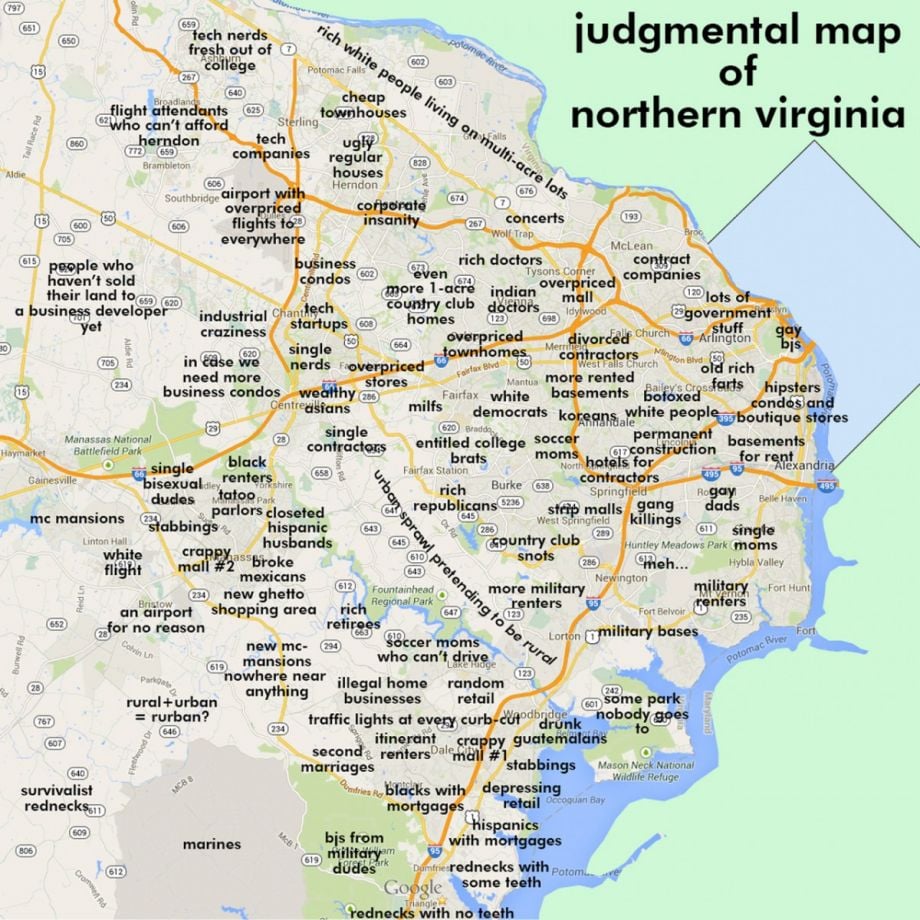
“Urban sprawl pretending to be rural.” Credit: Robert Thompson
NC: One of the things that struck me from looking at the Memphis judgmental map is a stamp with Elvis’ face, surrounded with the word ghetto all over. How do you trust someone’s demarcation of what’s hood? What’s ratchet? What’s grimey?
Gillaspie: Part of that is them knowing the town better than I do. If we had seven maps submitted from Memphis, that’s a different story. In terms of validating those stereotypes, there’s not a whole lot I can do about it. I can’t say, “Well, hold on, I’m going see if this Elvis face, and this ghetto, and this area are all correct.” I can’t go to Memphis. I could verify it, but part of it is just putting it out there and getting the response, whether it’s positive or negative. And for the most part it’s “Oh, this is really accurate,” or “This area doesn’t have this.”
Really it’s about taking them for their word. I might send it to some people in the area, if I have some friends, and put it out to a test market if I feel really unconfident about it. But for the most part, I trust their judgement, no pun intended.
NC: How do you see the site growing as you move forward?
Gillaspie: We’ve actually had a few more cities submitted this week with some great maps, and two of them are international. With the international maps it’s been interesting, because I think there’s a different sense of humor internationally. We’ve had some maps submitted from South Africa, we’ve had maps submitted from Europe, we’ve had maps looking over into the Middle East. I’m going back and forth in conversations to make sure that, you know, does this make sense? Or is this spelled correctly? The next big step is to get the international community involved, and continue to see these maps grow out.
See all of the judgmental maps here. To submit a judgmental map, check out this form.
This post has been updated.

Cassie Owens is a regular contributor to Next City. Her writing has also appeared at CNN.com, Philadelphia City Paper and other publications.
Follow Cassie .(JavaScript must be enabled to view this email address)

